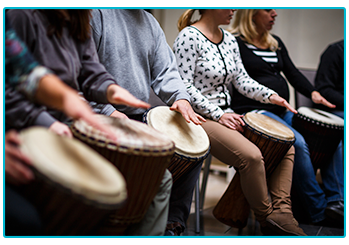Music can be a great means of escape from the day-to-day annoyances of life, or it can also be a good excuse for getting up and dancing! But do you know just how beneficial music can be for your health. Here at The Insurance Emporium, we’ve been doing some research into this question, and can now share our rundown of seven health benefits of music!

1. Boost your workout!
Have you ever noticed how much easier it is exercising to music? Numerous studies have shown this to be true, either because an uplifting beat can help you move faster, or it provides a welcome distraction that increases endurance. Whatever the method of boosting your workout, this health benefit of music could help you get fitter and reach your goals!
2. Reduce stress
Modern life can be hectic, with all kinds of demands on our time and attention, and can lead to us feeling stressed out by it all. Making time to unwind by listening to your favourite songs might actually help reduce stress. Not all music will have this effect, however, and it’s best to choose tracks you enjoy! Eight minutes of industrial death metal might not have the stress-relieving properties you need…
3. Relieve depression
In the same way that music can reduce stress, it also has the potential to lift our mood and relieve symptoms of depression. The kind of music you might choose for this purpose will be very personal and vary between individuals. There’s little point listening to relaxation or classical music if you just don’t like it. Instead, go for your absolute favourite tracks, whatever the genre!

4. Ease pain and heal faster
Music has the ability to make us feel calm, causing breathing to slow and muscles to relax. Because these feelings help to reduce anxiety, they can help reduce levels of pain in hospital patients or anyone getting over an injury. Music therapy is used to help patients in recovery dealing with discomfort, rehabilitation and even restoring speech!
5. Aids memory
Dementia is increasingly becoming a problem in the contemporary world, with our aging population. Music has become a useful tool in helping people with dementia or Alzheimer’s. It’s thought that even once a person loses the ability to speak, they can still communicate through both listening to and making music!
6. Get a better night’s sleep
Due to its ability to slow breathing and get your muscles to relax, it should come as little surprise that music can help ease you off to sleep! It’s best to limit your nightly music routine to slow tunes of between 60 to 80 beats per minute, to get your body ready for slumber. Familiar music that you know you enjoy can be the best choice, as it requires less concentration!

7. Get out more!
Last on the list of the health benefits of music is its capacity for increasing social interaction. Whether it’s chatting about the latest releases over a coffee, sharing music online or going to gigs and festivals, music is something that can get people talking! This might in turn help you to get out and about more often, something that could improve both physical and mental wellbeing!
The health benefits of music are varied, and could be a great reason to get home and put your favourite record on! If you’re a keen music maker yourself, you might want to consider taking out insurance to help protect your equipment. At The Insurance Emporium, our Music Insurance policies come with a range of Standard Benefits, as well as Optional Benefits to choose from such as Gadgets and Mobile Phone. You could also get a 25% Introductory Discount!* Head to The Insurance Emporium to find out more!
* The 25% Introductory discount is available for the first 12 premium payments on lunar and calendar monthly policies or one premium payment on annual policies.
All content provided on this blog is for informational purposes only. We make no representations as to the accuracy or completeness of any information on this site or found by following any link on this site. We will not be liable for any errors or omissions in this information nor for the availability of this information. We will not be liable for any loss, injury or damage arising from the display or use of this information. This policy is subject to change at any time.


